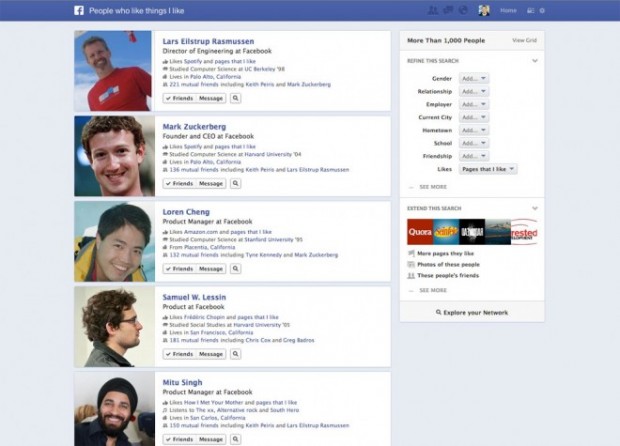Editor’s note: This post originally appeared on Jim Stroud’s blog The Recruiters Lounge.
I’m on the waiting list to play with Facebook’s new toy – “Graph Search.” Despite that fact, I have been a voracious reader in hopes of getting a thorough understanding of its potential as a recruiting tool. So far, I must say that I am very optimistic, but my glasses are not rose colored. As such, I wanted to drop a few notes on what I like and will most likely expect concerning this in the near and far future. (Now if you would allow me, let the speculation begin.)
What is Graph Search?
Graph Search is Facebook’s new and improved way of searching the vast amount of data on Facebook.
Or to quote Facebook…
Graph Search is a new way for you to find people, photos, places and interests that are most relevant to you on Facebook.
Let me first say, I do NOT like the name “Graph Search.” Although I get the name and how it applies, I think everyone will call it “Facebook Search” and that Facebook will eventually follow suit. Just my 2 cents there.
From what I have seen the interface is easy to use and the results are instantaneous. Facebook even suggests search terms as you type, a la “Google Suggest.” Based on what I have read, the “wow” feature is the photo search. You can find photos that you’ve commented on or liked, which is cool, especially if you want to find photos that you prefer stay buried or deleted.

But I digress, I don’t want to get into all it does from a general perspective. I want to view it from a recruiting perspective. And from that angle, me likee.
Recruiting with Graph Search
In some of the articles I read, recruiting was front in center in the minds of Facebook execs. This is something I am sure makes Monster and LinkedIn nervous. Consider these sourcing tips from Zuckerburg himself.
“One of my favorite queries is recruiting,” Zuckerberg said. “Let’s say we’re trying to find engineers at Google who are friends of engineers at Facebook.” He typed in the query and found, not surprisingly, that there were lots of people who met those criteria. Each one was represented by a little rectangle of information — their profile photo, along with snippets of key information like where they went to school, where they live, and the names of the mutual friends.
The excitement over how Graph Search (Ugh! I hate that name.) could be used for recruiting was further echoed by Lars Rasmussen, co-creator of the Graph Search (grr…) search engine.
“And suppose I want a job at Pinterest — which I don’t, for the record — and I want someone to introduce me there,” he said. “I can search for my friends who are friends with Pinterest employees.”
Another thing that appeals to me about Graph Search is that it works best with long tail searches. The more detailed the searches, the better the results. For example, instead of searching on “java programmers restaurants NYC,” in Graph Search my query would be, “What restaurants are liked by java programmers in New York City?” Get it? (And by the way, if a certain restaurant is popular with the folks you want to hire, why not have a meetup event there? Just a thought…)

I also like the built-in intuition I have been picking up on in the articles I read. For example, if Facebook thinks you are doing a recruiting query, it will present a few facts about each candidate’s work history on the results page. Most significant, each result has a search button allowing you to refine each set of results further. For example, if you were to look for java programmers who like coffee in New York City, you could further refine your results by limiting it to java developers in New York City who work for Company X. (Wink)
Consider this as a search query, “Photos java developers like in Austin, TX.” When Facebook returns those results, limit the results to people who work for Company X and then look at who is tagged in those photos.
Here is another (simpler) possibility, search “People who work at Company X” and then refine the search by job title. Voila! Want to find even more? Howzabout searching “Pages liked by people who work at Company X?” From there, I look at the comments and potentially reach out to people active on those pages.
I also read that one could create a page for a query and Facebook will auto populate the search results. Could this be a form of automated sourcing? The mind ponders, the mind ponders…
Is Graph Search a really big deal?
Today? No. In the future, ohhh yeah.
Overwhelmingly, the response to Graph Search has been positive. And again, I have yet to put my hands on it personally, but I am slightly skeptical. I do believe that it has the potential to change the game, so to speak. But it will not be an overnight thing as I think others believe. Let me layout a few thoughts around that.
# Facebook Search (yeah, I know, graph search) lets you search Facebook better. All the demos done (that I have seen) have been done by Facebook employees and power users who hang out with other Facebook employees and power users. In other words people who live and breathe social and tech, not the average joe. The average joe does not like and comment on everything as say, I would. The average joe has yet to completely fill out their “About” page, so I cannot find them on a graph search if there is no data to find. Make sense?
And this is NOT to say that there is insufficient data on Facebook About pages to search on with a variety of tools, I’m just saying that there could be a whole lot more data. If Facebook were to gently suggest to its users to fill that page out, I would do cartwheels (or, something similar, as I do terrible cartwheels).
Graph Search is not the end of job boards
I think its only a matter of time before someone writes an article saying that Graph Search marked the end of job boards and LinkedIn. In case you are of this opinion, allow me to offer a contrarian view. Facebook is slowly rolling out Graph Search and it will take a few years before its final vision is realized. From what I have read, there is no content being revealed that was not already public. If you know how to manage Facebook privacy settings, there is nothing to worry about. Be that as it may, there will be a section of users who will balk and complain that Graph Search encroaches on their privacy and double down on their efforts to hide their information.
As a result, they will run over to LinkedIn for its professional atmosphere and continue to post their information on job boards because (1) that is what they are used to doing and (2) promoting opportunities is the central purpose of job boards. Ironically, this will make job boards and LinkedIn more valuable because they will be a place to find people who DO NOT want to be found on Facebook. (Pretty much as it is today.)
To be clear, again, this is NOT to say that Facebook is not a good place for recruiting. It is a GREAT place to recruit, if you know how. (In fact, I recommend it.) However, there will be people who purposely hide from recruiters on Facebook and so choose alternatives. If you would like a bit of training on how to recruit with Facebook, send me a note. We at Bernard Hodes Group would be happy to serve you. Operators are standing by.
So what now?
As I said, I do not have access to Social Graph yet, but I do hope to have access soon. In the meantime, if you are a recruiter or sourcer with access, please try out some of the ideas posted herein. I would love to know the kind of results you are getting. Cool?
